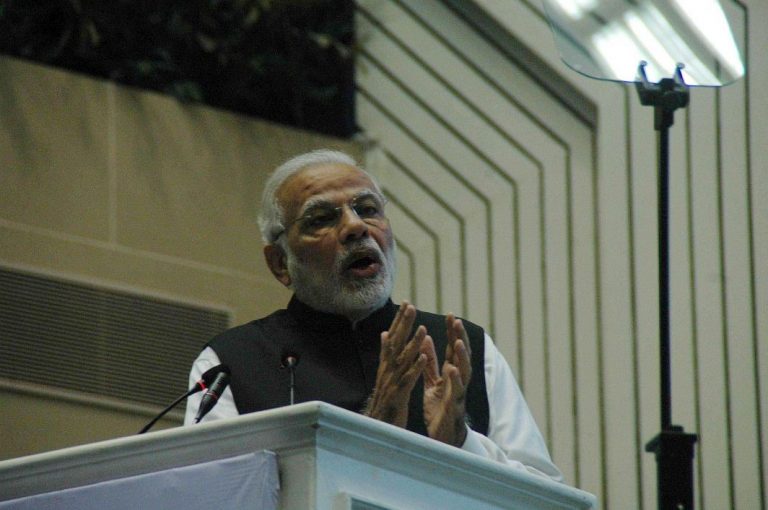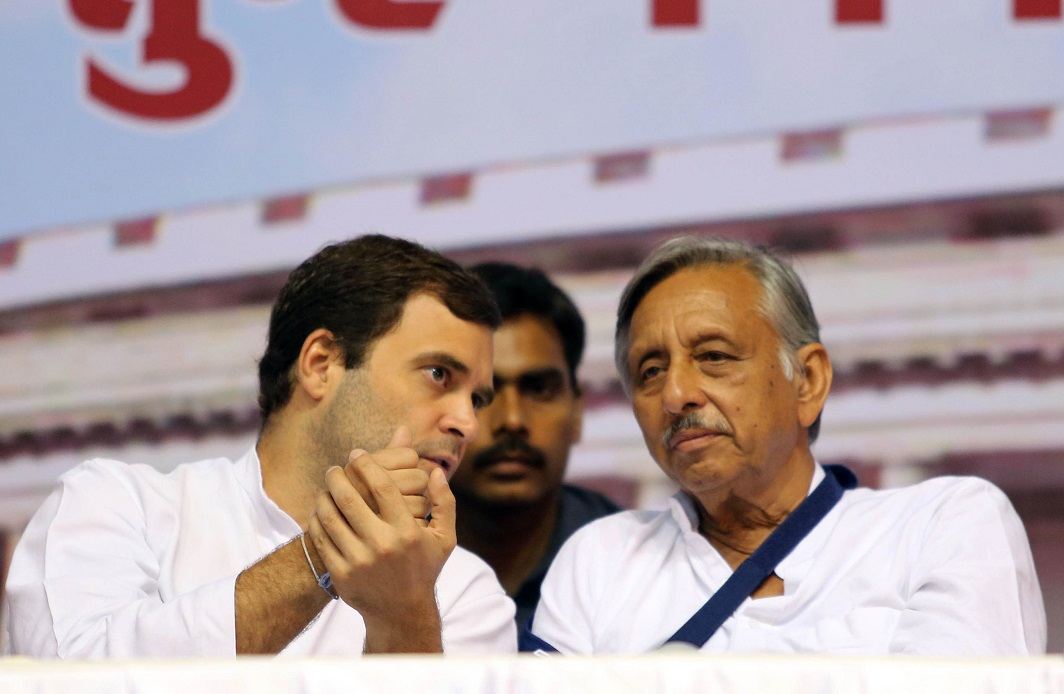
Above: By expropriating words and assigning them fresh meanings, Modi has robbed debates of nuance and silenced voices. Photo: UNI
The denigration of language in political discourse in recent times has signalled a decline in democracy. Only by reinventing language will the future of Indian democracy be reinvented
~By Shiv Visvanathan
Democracy and language have a reciprocity and a mutuality that need to be recognized and encouraged. Both embody notions of structure and freedom, both need rules to sustain creativity, both celebrate a sense of disorder but neither can abandon meaning. Both can rise to the sublime and degenerate to the ridiculous. In both, meaning is never univocal for long. Both need polysemy and plurality, both thrive on diversity and translation, both celebrate irony, paradox and ambiguity and yet use it to semaphore the meaning of the time.
Both suffer from similar disease. When democracy becomes majoritarian, it loses its sense of dissent, marginality, eccentricity. When language becomes standardised, it becomes boring and univocal. Neither can be official and when officially defined, they immediately signal a loss of creativity. Each can be used to read the other and it is easy to see how a failure of language becomes a sign of the decline of democracy. Yet, language has something subtle about it. It shows that the pathologies of language under a dictatorship and the disease of language under a majoritarian democracy are different. They, in fact, demand different forms of storytelling.
LANGUAGE AND DEMOCRACY
Majoritarian democracy has a touch of the oxymoron, a sense of the Chimera to it. Majoritarianism by invoking the logic of demography and number immediately proceeds to undermine language by officializing it. When language marches in uniform, democracy loses its elasticity. When words are univocal and officially procrustean, democracy already loses its playfulness. In fact, it is the first casualty of our time. Words like nation, nation state, patriotism, development, history are all official words with officially defined meanings. The officialdom of words is blatant and as a result, all dissenting, marginal, minoritarian languages become taboo.
The second tragedy of language is silence. As violence develops its innovative forms, amnesia and obsolescence take over and memory loses its power to fight such forms of erasure. Indifference has no place for storytelling. A rape, a lynching, a brutal beating all get officialised as terse first information reports. Each becomes a failure of storytelling and each becomes embedded in a silence which awes. The silence that surround disasters, rape, incest is devastating as official language celebrates the good times, the great celebration called Acche Din.

One can sense the decline of democracy as we watch one of its great festivals, Elections. Elections at one time were a carnival of language, an explosion of orality where the political waxed close to the poetic. Liberation movements like Dalit groups had their own poetry. The DMK as an imagination could not have existed without the power of film. Yet, today’s regime is hostile to language and its use of language moves between policing and paranoia.
Recently, when an issue came up in the Supreme Court regarding freedom of speech of a person in public office, in authority or in charge of governance, it got referred to a constitution bench. The issue was of such importance that many senior advocates of the apex court argued the matter and assisted the Court.
The issue erupted when senior UP politician Azam Khan in August 2016 referred to a minor’s rape as a “political conspiracy only and nothing else”. An FIR was lodged against him at Bulandshahr district in UP and later, the victim’s father approached the Court for taking action against him. Although Khan was released after an unconditional apology, a bench of Chief Justice Dipak Misra, and Justices DY Chandrachud and AM Khanwilkar referred the matter to a constitutional bench while framing four important issues to be decided.These are:
(i) When a victim files an FIR alleging rape, gang rape, murder or such other heinous offences against another person or group of persons, whether any individual holding a public office or a person in authority or in charge of governance, should he be allowed to comment on the crime stating that “it is an outcome of political controversy”, more so, when as an individual, he has nothing to do with the offences in question?
(ii) Should the “State”, the protector of citizens and responsible for law and order, allow these comments as they have the effect to potentially create distrust in the mind of the victim as regards fair investigation and the entire system?
(iii) Whether the statements come within the ambit and sweep of freedom of speech and expression or exceed the boundary that is not permissible?
(iv) Whether such comments (which are not meant for self-protection) defeat the concept of constitutional compassion and of constitutional sensitivity?
The Bench also observed that the questions framed by the Court involve an extremely significant issue relating to freedom of speech and expression within the constitutional contours. It asked whether the right conferred under Article 19(1)(a) is to be controlled singularly by the language employed under Article 19(2) or whether the other fundamental right, ie, right under Article 21, would have any impact on it.
The issue is pending with the Court, but its importance can be gauged from the Court taking cognisance of it.
—Vinay Vats
Prime Minister Narendra Modi’s attempt to appropriate the language of the national movement officialises and impoverishes Gandhi and Patel. Yet, in his very arrogance, in defining inside and outside in history, one senses his contempt for democracy. Rahul and Sonia Gandhi, as threats to the BJP, are non-Hindus, non-Indians and therefore, ineligible to be part of Indian democracy. A paranoid majoritarian regime exiles or alienates most of its citizens as if they are in the opposition. One sees this more clearly in the BJP’s reaction to Archbishop Thomas Macwan of Gandhinagar.
Macwan’s letter to his flock was rational and transparent. It was an appeal to the two great faiths of his life, Christianity and the Constitution. He asked his flock to believe in the power of language and values and to vote in terms of their conscience. Modi calls Macwan’s letter an attack on Desh Premis, where only the official and the majoritarian can be patriotic. The Orwellian nature of a PM’s discourse becomes clear as we watch him distort the transparency of Macwan’s speech.
The Orwellian newspeak is manifested also in the attempt to deliberately misinterpret what Mani Shankar Aiyar said. Aiyar, a colourful man with a colourful sense of language, described Modi’s attempt to appropriate Ambedkar as neech. The word here is used as an adjective but media deliberately describes it as a noun, so Aiyar is seen as an elitist snob dismissing a lowly prime minister.
One can sense the decline of democracy as we watch one of its great festivals, Elections. Elections at one time were a carnival of language, an explosion of orality where the political waxed close to the poetic…. Yet, today’s regime is hostile to language and its use of language moves between policing and paranoia
The deliberate distortions of Aiyar’s critique or Macwan’s letter are examples of Modi-speak, where an honest statement is deliberately read out of context to libel the speaker. The sadness here is that there is no attempt to examine the words. Modi like an angry Alice has decided he will determine what words can say. However, unlike Alice, his use of words is more Kafkaesque. It sends a tremor of doubt and discontent into the audience who realise rights are of little use when language itself lacks a sense of trust.
COLLAPSE OF HISTORY
The scars of memory are seen in language. One saw it starkly in the stark murder of Afrazul. The Afrazul story begins with the clamour against the film Padmavati. The Karni Singh gang is clear that a cinematic Padmavati cannot be permitted. They demand both a censoring of language and film. Padmavati is a prelude to the second part of the film called Citizen Shambhulal.
Here, a builder triggered by his anger against Love Jihadi and Padmavati, murders an innocent Muslim. As we watch the eerie video taken by his nephew, one senses that history, like language, has to be exorcised of all diversity. There is only one history and therefore only one meaning of a word. Yet it is with awe that we watch illiteracy turning authoritarian. Our citizen Shambhulal is almost autistic in his use of words. In a linguistic sense, it is as if historical aphasia, a collapse of history into incoherence, is evident in a linguistic autism where he mumbles words like Love Jihadi, Padmavati as incoherent telegrams from a violent self.
The sadness does not stop there. Ordinary language does not protest the destruction of the word. Only a few civil society groups like Aruna Roy’s MKSS protest reestablishing the basic promise between politics and the word. In fact, the protest groups realise that language and democracy are both under threat in the current politics of our time.
However, criticising the decline of language alone will not do. Protest cannot be a literal critique. We need an explosion of language and metaphors to revive politics. In fact, the return of the opposition has to be signaled by the return of language, the plurality of one sustaining the multiplicity of the other. The fable is clear; the reinventing of language will help reinvent the future of Indian democracy.
—Shiv Visvanathan is a member of the Compost Heap, a commons of ideas exploring alternative imaginations.

